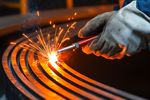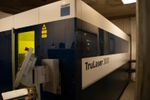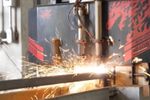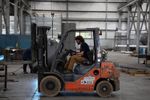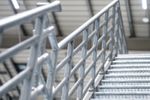When visiting a metal fabrication factory, you will likely first notice the large machinery necessary to work and transport heavy metal. You’ll see plenty of raw materials and the atmosphere will be generally loud.
That’s because while many metal fabricators tend to focus on certain specialty areas, most involve themselves in a wide range of projects. Accommodating such varied projects makes metal fabrication an equipment-intensive pursuit.
So while there are times when the scene on the floor of a metal fabrication factory may appear to be chaotic, there are very well-defined procedures that take place within each specific department. Here’s an introduction to each to help you navigate the shop floor.
Design
Many customers know exactly what they want while others have an idea of what they want but don’t know how to get there. Ultimately, any metal fabrication project will need a design to get started — some sort of documentation that will give shape to the initial idea.
Designs are then often delivered to the metal fabricator using a variety of software programs but it’s not unusual for clients to present their ideas hand-drawn on a piece of paper.
Designs must not only be functional and involve knowledge of metals and metal working but often must take into consideration regulations set forth by the Occupational Safety and Health Administration (OSHA) and The American Welding Society (AWS).
Cutting
One of the basic capabilities a metal fabrication factory must have is the ability to cut raw materials to size.
This is not as simple as one may initially think. Various metals have differing “personalities” and metal thickness will greatly impact the best method for cutting.
Options available can include sawing, shearing, laser cutting, and CNC high-definition plasma cutting.
Forming
Another way metal can be manipulated in a metal fabrication factory is through forming.
Forming techniques include bending the metal into the desired configuration, rolling it into cylindrical shapes, and punching it to cut holes or notches into the metal. Properly forming metals takes significant knowledge of a metal’s tolerances to manipulation, ensuring the process doesn’t weaken the metal significantly.
Welding/Assembly
When many envision a metal fabrication factory, they picture sparks flying as metals are welded together. Welding is indeed a critical department in metal fabrication and is part of the industry’s assembly services.
Most fabrication projects involve a series of parts that must ultimately be put together. Because of the nature of the material, metal is most often welded to accomplish permanent assembly.
Again, depending on the type and thickness of the material, a variety of welding processes may be used, including MIG welding, TIG welding, and stud welding machines.
Finishing
A metal fabrication factory with a full-service finishing department can likely produce just about any finish you desire for your final product.
Of course, with metals, the proper surface preparation and finishing techniques must be employed to ensure the desired finish that will prevent or, at least deter, corrosion. Frequently, metal surfaces are prepared using wire brush or metal bead blasting techniques.
Other finishing techniques include painting, hot-dip galvanizing, and powder coating.
Installation
For large projects, it may be important for you to select a metal fabrication company that offers in-the-field installation services. This is necessary when projects are so large they must be shipped in segments.
In some cases, the cost of on-site installation may be offset by the savings incurred by shipping a large project in pieces. This is an important topic to discuss early on in the development of your project.
Quality Control
One of the most important departments in a metal fabrication factory is quality control.
Metal fabrication projects are often unique and custom made. They involve a lot of hands-on manipulation of the metal, often with low tolerance for errors.
A metal fabrication company with high quality standards is more likely to satisfy their clients consistently.
Choosing the Right Metal Fabrication Factory for You
Choosing the right metal fabrication company for your project takes due diligence. You will likely want a company with experience and — better yet — a company experienced at producing the types of products you are looking to have created.
If you don’t have drawings, choosing a company with engineering services will be valuable. You’ll also want to choose a fabricator that has the equipment and capabilities to complete your project properly and, preferably, all in house.
Most of all, you’ll want a metal fabricator who has a solid reputation, such as Southern Metal Fabricators. Based in Albertville, Alabama, we’ve been serving the Southeast with quality metal fabrication services for over 30 years, helping companies in the agricultural, automotive, petroleum, and power generation industries by providing them with a reliable custom metal fabrication partner.
Contact us via the web or call 1.888.421.9661 to learn more about our capabilities and how we can help you create the fabricated metal products you need.

